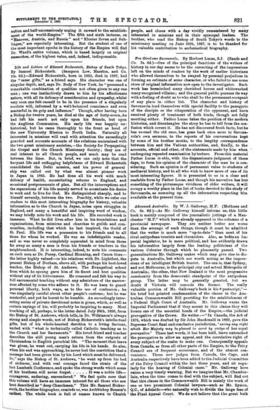Life and Letters of Edward Bickersteth, Bishop of South Tokyo.
By Samuel Bickersteth. (Sampson Low, Marston, and Co. 10s. 61)—Edward Bickersteth, born in 1850, died in 1897, had the "rarer gifts," as a friend says. His character was one of singular depth, and, says Dr. Body of New York, he "possessed a remarkable combination of qualities not often given to any one man ; one was instinctively drawn to him by his affectionate nature, with all its delicacy of consideration and sympathy, whilst very soon one felt oneself to be in the presence of a singularly resolute will, informed by a well-balanced conscience and even masterful in its grip and influence." Though, after having been a Bishop for twelve years, he died at the age of forty-seven, ,he had left his mark not only upon his friends, but upon the Anglican Communion. His early life was happily un- historical, but he came thoroughly to the front as head of the new University Mission to North India. Naturally all interested in missions will read with attention the exceedingly guarded and accurate accounts of the relations maintained with the two great missionary societies, —the Society for Propagating the Gospel and the Church Missionary Society ; they are of real interest to all Church people, and much may be read between the lines. But, in brief, we can only note that the buoyant life and unflagging helpfulness of Edward Bickersteth consolidated the Delhi mission, and his power of general ship was called out by what was almost pioneer work in Japan in 1885. He had done all his work with much delicacy of health, necessitating returns to England, and occasional postponements of plan. But all the interruptions and the separations of his life merely served to accentuate his desire to work and to live for God. He distinguished sharply, and to himself severely, between the two. Possibly, while we refer our readers to this most interesting biography for history, valuable information as to the Church in Japan, notes upon strUggles in England, and many a beautiful and inspiring word of wisdom, we may briefly note his work and his life. His recorded work is immense. What he did lives after him in his foundations and organisations, from missions and churches to guilds and com- munities, including that which he last inspired, the Guild of St. Paul. His life was a possession to his friends and to all those for whom he worked. He was an indefatigable reader, and so was never so completely separated in mind from those far away as many a man is from his friends or teachers in the neighbourhood. It is interesting, indeed, to note his comments on such men as Dr. Pusey, Cardinal Manning, and Canon Gore— the latter highly valued—or his relations with Dr. Lightfoot, the present Bishop of Durham, above all, with perhaps his best-loved teacher, the Bishop of St. Andrews. The Evangelical school from which he sprang gave him of its finest and best qualities without any Of its bitternesses. He reasoned and felt his way to full sacramental teaching without any admixture of the narrow- ness affected by some who adhere to it. He was keen to guard personal liberty, both ways, as to the use of confession ; he was singularly careful about other people's customs; but ho was masterful, and yet he learnt to be humble. An exceedingly inter- esting series of private devotional notes is given, which, as Well as certain sayings of his, will probably be inspiring to many. Most touching of all, perhaps, is the letter dated July 28th, 1899, from the Bishop of St. Andrews, which tells, in Dr. Wilkinson's always strong-and simple words, not 'of Bishop Bickersteth's intellectual gifts, but of his whole-hearted devotion to a living Saviour, united with " what is technically called Catholic teaching as to the Church and her Sacraments." His loved friend and teacher describes the still young man's return from the outposts of Christendom to English parochial life. "The moment that leave was given, he went out, carrying his life in his hands. So also, when his end was approaching, he never lost the conviction that a message had been given him by his Lord which must be delivered. So," says the Bishop of St. Andrews, "he went up from his bed of sickness, and with real courage faced the strain of the last Lambeth Conference, and spoke the strong words which some of his brethren will never forget It was a noble life— Courageous, enduring, surrendered." We feel quite sure that this volume will have an immense interest for all those who are best described as "deep Churchmen." This Mr. Samuel Bicker- steth, the brother-biographer, reminds us, was Archbishop Benson's epithet. The_ whole book is full of names
known to church people, and closes with a day vividly remembered by many interested in missions and in their episcopal leaders. The brother, who read the Bishop of South Tokyo's words to the missionary meeting on June 25th, 1897, is to be thanked for his valuable contribution to ecclesiastical biography.






















































 Previous page
Previous page